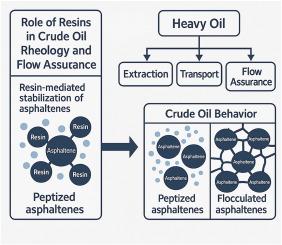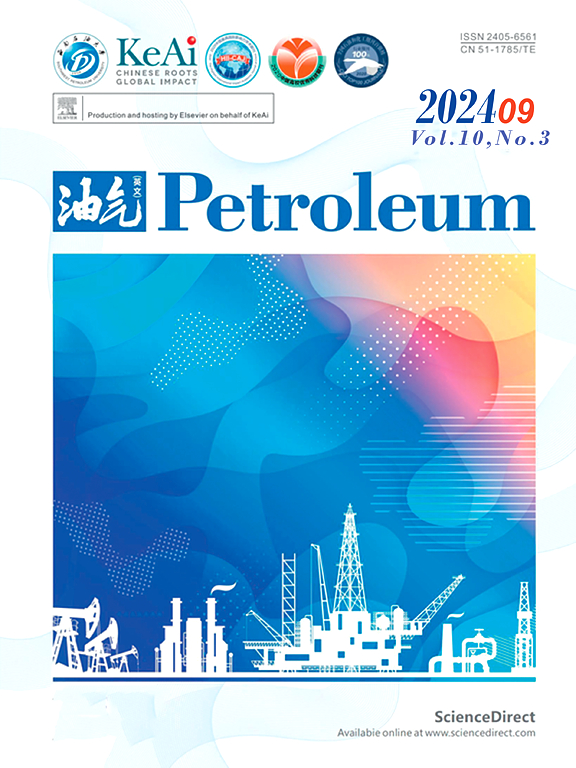树脂在原油流变学和流动保证中的作用:综述
IF 3.5
Q2 ENERGY & FUELS
引用次数: 0
摘要
树脂是原油的重要组成部分,不同于沥青质,在影响流变性能和流动特性方面起着至关重要的作用。在原油作业和海上作业中,了解树脂的行为尤为重要,因为在这些作业中会出现流动保障方面的挑战。本文综述了树脂对原油流动和流变性能的影响。它研究了树脂的各种组成以及树脂与沥青质的分子相互作用,这些相互作用决定了原油的粘度和稳定性。某些原油中存在高浓度的树脂会使流动保证和管道运输复杂化。最近化学处理和添加剂技术的进步解决了这些挑战。本文重点介绍了旨在提高对树脂在极端条件下(如高压和高温储层)行为理解的新兴研究领域和技术。通过这一综合分析,综述旨在为树脂在原油流动中的作用提供有价值的见解,指导未来石油工程的研究和创新。本文章由计算机程序翻译,如有差异,请以英文原文为准。

The role of resins in crude oil rheology and flow assurance: A comprehensive review
Resins are a significant component of crude oil, distinct from asphaltenes, and play a crucial role in influencing both rheological properties and flow characteristics. Understanding resin behavior is particularly important in crude oil operations and offshore operations, where flow assurance challenges can arise. This review article focuses on the impact of resins on the flow and rheological properties of crude oil. It examines the various compositions of resins and the molecular interactions between resins and asphaltenes that determine the viscosity and stability of crude oil. The presence of high concentrations of resins in certain crude oils can complicate flow assurance and pipeline transportation. Recent advancements in chemical treatments and additive technologies have addressed these challenges. This review highlights emerging research areas and technologies aimed at improving the understanding of resin behavior under extreme conditions, such as high-pressure and high-temperature reservoirs. Through this comprehensive analysis, the review aims to provide valuable insights into the role of resins in crude oil flow, guiding future research and innovations in petroleum engineering.
求助全文
通过发布文献求助,成功后即可免费获取论文全文。
去求助
来源期刊

Petroleum
Earth and Planetary Sciences-Geology
CiteScore
9.20
自引率
0.00%
发文量
76
审稿时长
124 days
期刊介绍:
Examples of appropriate topical areas that will be considered include the following: 1.comprehensive research on oil and gas reservoir (reservoir geology): -geological basis of oil and gas reservoirs -reservoir geochemistry -reservoir formation mechanism -reservoir identification methods and techniques 2.kinetics of oil and gas basins and analyses of potential oil and gas resources: -fine description factors of hydrocarbon accumulation -mechanism analysis on recovery and dynamic accumulation process -relationship between accumulation factors and the accumulation process -analysis of oil and gas potential resource 3.theories and methods for complex reservoir geophysical prospecting: -geophysical basis of deep geologic structures and background of hydrocarbon occurrence -geophysical prediction of deep and complex reservoirs -physical test analyses and numerical simulations of reservoir rocks -anisotropic medium seismic imaging theory and new technology for multiwave seismic exploration -o theories and methods for reservoir fluid geophysical identification and prediction 4.theories, methods, technology, and design for complex reservoir development: -reservoir percolation theory and application technology -field development theories and methods -theory and technology for enhancing recovery efficiency 5.working liquid for oil and gas wells and reservoir protection technology: -working chemicals and mechanics for oil and gas wells -reservoir protection technology 6.new techniques and technologies for oil and gas drilling and production: -under-balanced drilling/gas drilling -special-track well drilling -cementing and completion of oil and gas wells -engineering safety applications for oil and gas wells -new technology of fracture acidizing
 求助内容:
求助内容: 应助结果提醒方式:
应助结果提醒方式:


